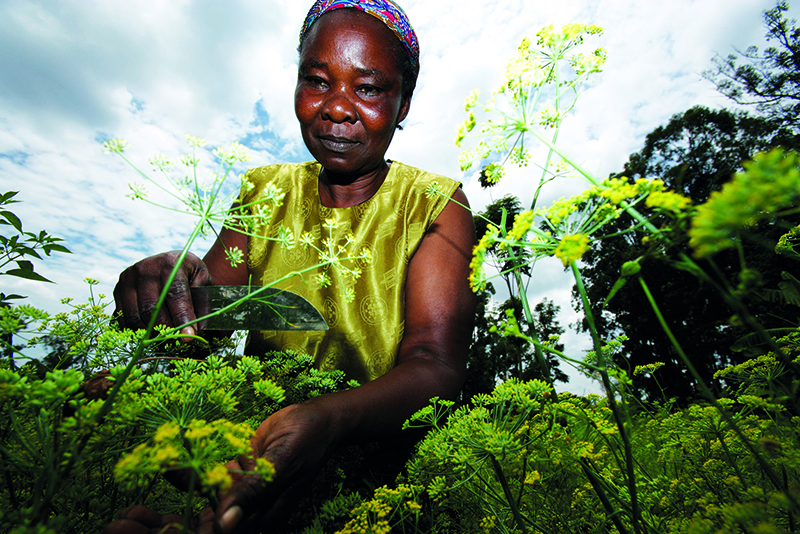Home to the world’s youngest population, untapped natural resources and a growing middle class, Africa has become the target for investors keen on high returns. What the continent needs, however, is for these investors to hold a long-term view to growth, and partner with the countries’ social and economic development

Africa houses some of the fastest-growing economies in the world, making them rife with invest-
ment opportunities. Compared to global forecast growth of 3.2% in 2015, Kenya’s GDP alone is expected to grow about 6%, making it the country with the third-fastest projected growth in 2015, according to the International Money Fund. Nigeria, Africa’s largest economy, is also expecting growth of 7.3% in 2015. In contrast, the U.S. is expected to grow 3.1%, and the eurozone, a mere 1.2%.
By the year 2050, the earth is set to have a population of 9.6 billion people, who will all need to eat. Right now, their best bet is Africa, where 50% of the world’s uncultivated, arable land lies. This means the agriculture business in Africa could develop into a trillion-dollar food industry by 2030, up from $313 billion in 2010, if that land is put to use, according to World Bank estimates.
This is just one example of the potential for growth in Africa, and people have taken notice. The space race is over, but two powerful nations are still vying for a stronghold in the next great endeavor of the future: development in the African continent, where returns are expected to yield 6% to 7% for decades, according to Market Watch. The United States and China are locked in a struggle for influence on the continent, and the U.S. is falling behind. China has taken the lead, with $200 billion in trade with Africa in 2013 and $75 billion in investments from 2000 to 2011, according to U.S. News & World Report.
President Barack Obama has taken strides to correct this imbalance, pledging to invest $33 billion in Africa, an outlay that could work to cement long-term relationships and democratic ties throughout the continent. While some argue that China’s interest in Africa is based on short-term monetary gain, the U.S. is considered to be a long-term partner in Africa, where economic interests and American ideals can help to create stability among African states.
The Export-Import (Ex-Im)
Bank plays a key role in supporting trade and commerce among U.S. companies working abroad. In the emerging markets of sub-Saharan Africa, for example, where credit is insufficient or hard to come by, American companies rely heavily on the bank. In addition, Ex-Im Bank is a vital component of the Department of Commerce’s Doing Business in Africa campaign, as well as the U.S. Trade and Development Agency’s U.S.-Africa Clean Energy Development and Finance Center.
In this way, Ex-Im Bank serves as the means to two ends: it can support American businesses and also help to promote positive initiatives and development on the African continent. One key example of this double function can be seen in the bank’s collaboration with other U.S. companies to fulfill President Obama’s goal of doubling sub-Saharan Africa’s access to electricity.
Indeed, as the security and prosperity of Africa increase, another solid reason for investment there emerges: a newly minted middle class, driven by the world’s youngest population.
“Demographic shifts, including an increasingly urbanized population with more disposable income, mean that Africa presents a staggering amount of opportunities for businesses that serve these shifts,” said African Private Equity and Venture Capital Association, or AVCA, in a research report earlier this year.
The trend among private equity firms certainly supports the idea of Africa as an increasingly attractive investment destination. In 2014, private equity investment totaled $8.1 billion in the continent, up from $1.5 billion in 2009. These numbers suggest investment in Africa should be able to “ride the wave of any short-term global and local uncertainties,” according to AVCA.
Although natural resources are a more traditional investment in Africa, many private equity firms are focusing on Africa’s consumer base, comprised of younger workers with a growing amount of disposable income. Consumer discretionary items, which can be thought of as “wants” versus “needs” (i.e. television versus food) received 15% of these investment funds.
Yet basic needs are also still being met through private investment. In August 2014, Africa’s wealthiest individual, Nigerian business magnate Aliko Dangote, teamed up with Blackstone Group LP and Carlyle Group LP (the world’s two largest private equity firms) to invest in energy infrastructure. Speaking at an Obama-hosted event at the University of Johannesburg in July 2013, Mr. Dangote pledged up to $15 billion for investment opportunities around the continent over the following four or five years and said there was no better time to invest in Africa than now.
The market in Africa is rich with investment opportunities and growth. Not only are larger economies on the continent experiencing more than double the global average in growth, but other economies such as Zambia are also expecting more than 7%, according to the IMF. The continent undoubtedly offers opportunities to yield high returns for intrepid and forward-thinking investors.
0 COMMENTS